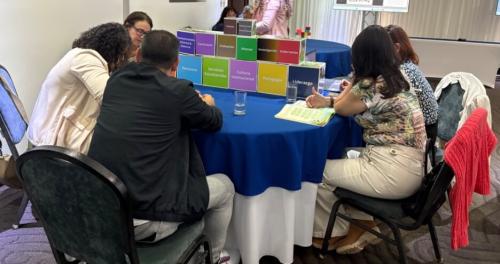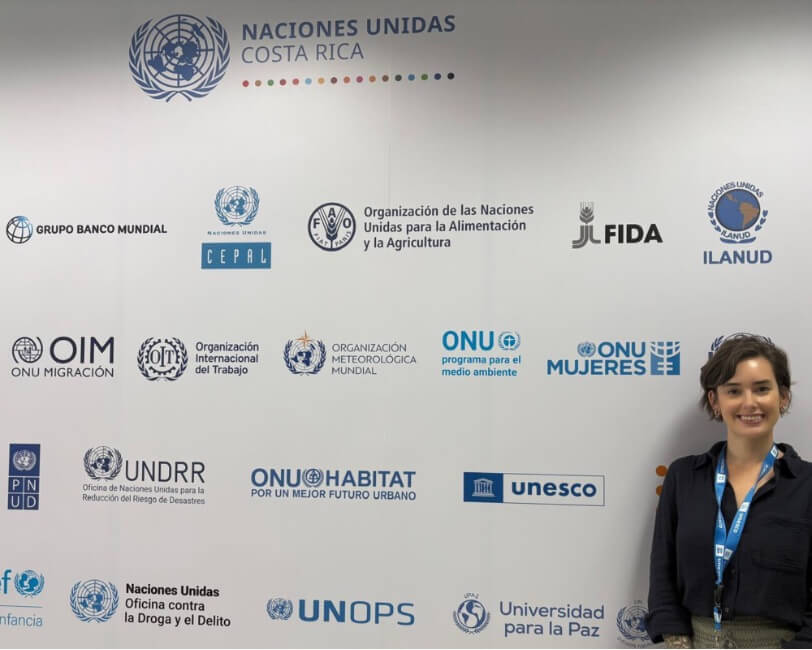¡Buenos dias, todos y todas de San José, Costa Rica! Pura vida!
Good day, everyone, from San José, Costa Rica! Pure life!
My name is Lily Griffin, and I am a 2025 GW UNESCO Fellow. I am currently completing my fellowship in San José, Costa Rica. UNESCO San José works with the organization's five thematic areas: education, natural sciences, social and human sciences, culture, and communication & information. These thematic areas are promoted by UNESCO through collaboration across organizations in Costa Rica, México, El Salvador, Honduras, Nicaragua, Panama, and the Dominican Republic.
In my fellowship, I support the education unit’s research for education in rural contexts. Specifically, I am exploring the concept of “new rurality” and innovation in education in rural contexts. The outcomes of this research will lead to a virtual training, similar to a MOOC (Massive Open Online Course), a speaker series, as well as a literature review to complete a full report for UNESCO on the status of education in rural contexts.
This assignment is exciting because it will be the first comprehensive report from UNESCO on education in rural contexts in decades. Each day of research, I am compiling resources, discovering innovative case studies, and working with experts to create materials which will center the dynamics of rural education and explore novel ideas to fortify education in these contexts. The innovation, and exploration of the subject in a pivotal time in urban and rural development, makes this work incredibly rewarding.
Outside of this project, I assist the education unit and other units with UNESCO with education for sustainable development (ESD) within the framework of the UN Sustainable Development Goals (SDGs). On June 16th and June 17th, 2025, I attended Presentación de experiencias de investigación a UNESCO y el MEP or Presentation of research experiences to UNESCO and MEP. The event gathered four schools across Costa Rica to present the project they were completing at their school which integrated components of the SDGs and ESD.
The overall goal of this meeting was to strengthen collaboration between schools in Costa Rica, UNESCO, the Ministry of Education in Costa Rica (MEP) by promoting tools to strengthen the development of institutional plans, pedagogical competencies, and the assessment of learning. Eleven countries worldwide participate in "Transforming Futures: Enhancing the Practice of Education for Sustainable Development (ESD) by 2030 through Action Research", a global initiative led by UNESCO. The aim of this project is to strengthen implementation of projects and activities on sustainable development in educational centers with an action research approach.

The gathering started with an icebreaker which introduced each other while centered the SDGs. Per the instructions, I introduced myself by my name “Lily” and used the first letter of my name related to one of the SDG goals I was passionate about. While SDG 14 starts with “L” in English (Life Below Water) it doesn’t translate in Spanish (Vida Submarina). In fact, no SDGs in Spanish start with L, so I had to be a little creative! However, I stated my passion for SDG 14, “limpieza el mar”, or cleaning the oceans. I explained how much life depended on the oceans, not just ours, but an entire ecosystem. I was proud of myself for expressing my thoughts in Spanish with clarity and even received a surprising (and literal) pat on the back from the UNESCO organizer, Ricardo. It was rewarding to connect with others who shared the same passion and urgency I have for the SDGs.
Afterwards, the presentations began. I took notes as the following education centers presented their concepts of their ESD project for the cohort of gathered educators:
- Aserrí High School, Desamparados Regional School: "Strengthening Alternative Conflict Resolution among Students to Promote a Culture of Sustainable Peace”
- Yorusti School, Heredia Regional School: "Carbon Footprint Measurement”
- San Francisco School, Western Regional School: "Finca Tierra Prometida as a Cradle of Entrepreneurship”
- Humanistic School, Nicoya Regional School: "Ecosocial Leadership”
- Orosi Technical School, Cartago Regional School: "Pollinator Garden”

Each presentation was incredible. I found the case studies, reports, and projects which I studied in the classroom at George Washington University in practice right in front of my eyes. While there were limitations, for example, a school which was measuring their carbon footprint realized that the infrastructure outside of their control, including good, paved roads, large sidewalks, marked signs for pedestrians, deterred reduction of carbon emissions from transportation. Beyond the limitations, the experience was hopeful and encouraging.

After the presentations, the groups workshopped their goals and received feedback. Many expressed how inspired they were by each other. Some counseled others through difficult topics, such as violence in schools. This time spent was important for building relationships across the education centers in Costa Rica as well as building a coalition committed to the SDGs.
This experience, as well as my other experiences at the office in San José, showcase considerable growth and understanding for me. Each day, little by little, I grow to understand how the right to education and the SDG goals are implemented from México to Colombia. This slow, but incremental, progress reminds me of another way of living: pura vida. There’s really no translation that encapsulates the meaning of this word, synonymous to Costa Rican lifestyle. It’s a polysemous word which can be used as a greeting, a goodbye, and a remark, but they all have the same meaning. When I hear these words, I see it as a call to action: to live in the present, this pure moment. Sometimes life in Costa Rica can move much slower than that of the United States. While it may not be perfect, the present has its own inherent purity.
¡Pura vida!
Lily is a Master’s candidate in International Education at the George Washington University. Her research focuses on the realization of social, cultural, and economic rights of communities in rural contexts.


